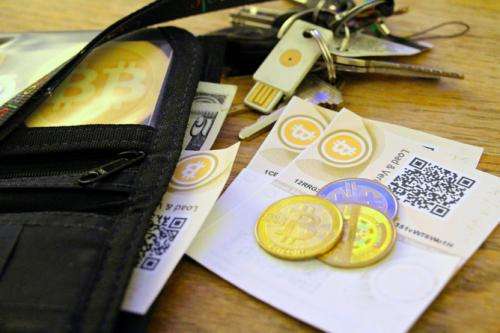University's bitcoin gimmick masks accountability problem with online currency

Cumbria University is to allow some students to pay their tuition fees in bitcoin, the digital currency hitherto more associated with drugs and guns.
But target students probably don't already have ready access to bitcoin and will have to buy it in order to pay their tuition fees, so the move is probably best seen as a publicity stunt than a real convenience.
Even if Cumbria is jumping on a bitcoin bandwagon, there are signs the digital currency is gaining acceptance, and is here to stay. US Federal Reserve Chairman Ben Bernanke stated last November that there was no need to regulate bitcoin and that virtual currencies are promising as more efficient and more secure payment systems.
More enthusiasm for bitcoin comes in the form of dedicated ATMs, known as BTMs, which are now springing up everywhere, allowing users to put in normal currency and receive bitcoin back via a mobile phone app. A report by Merrill Lynch predicts bitcoin will become a ubiquitous means of electronic payment and come to account for 10% of all electronic transactions conducted online.
But not everyone agrees. China's Central Bank, for example, has decided that Chinese financial institutions should not accept bitcoin. This is a policy aimed at protecting the property rights of the public, safeguarding the renminbi status as a fiat currency, preventing money laundering and maintaining financial stability. Other countries such as Thailand and Norway have also taken a sceptical stance.
Big brother is not watching you
Like Twitter in the Arab Spring and mobile phones in Africa, bitcoin is a technology that wrests power from governments and gives it to the people. It seems likely it will soon be as widely accepted as traditional currencies. As they have the advantage of privacy, low transaction costs, and potentially no fat-cat bankers profiteering, it sounds like cryptocurrency could be a win-win for society.
But this privacy and convenience comes at a cost. Society is already facing huge difficulties regulating the online worlds of drugs and gun trading and child pornography. The US authorities recently shut down Silk Road, the marketplace where users could buy all kinds of illicit goods, safe in the knowledge that the transactions were hidden in the Tor network, but its place was quickly filled by rivals. Even while legitimate uses for cryptocurrencies abound, its use as an effective way to buy illegal goods continues to undermine its potential as a mainstream currency.
A world in which people can trade anything anonymously using bitcoin could be a world where drug barons buy and sell guns, cars, houses and whole streets without regulation, without taxation, and without accountability. With bitcoin, criminals don't need to find ways to launder money – it's already clean.
Balancing privacy and accountability
No one wants to live in a world in which corporations such as Google and Amazon track and mine our spending habits and spam us endlessly. Even fewer are happy with the idea that the NSA can collect and store our emails indefinitely and can at any time retrospectively analyse them all. But regulation has an important place. A world in which there is no accountability of spending is a world without taxation and therefore without a civilised society.
Somehow we have to find ways of balancing the opposing needs of individual privacy and societal security. Big data, the ability of computers to produce and store information about the minutae of our everyday lives, is here to stay. But it gives rise to a question which seems very hard to answer. Exactly what kind of freedoms should people have?
Provided by The Conversation
This story is published courtesy of The Conversation (under Creative Commons-Attribution/No derivatives).
![]()




















